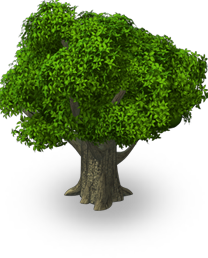Broad Street
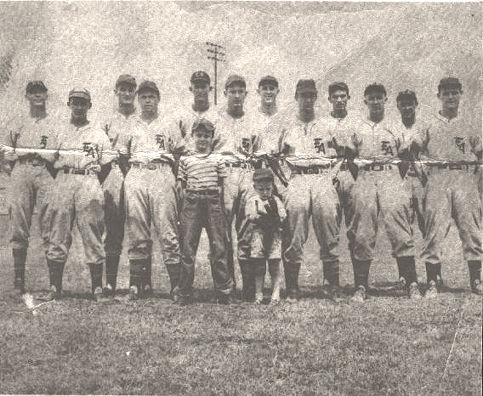
Erwin Mills had its own baseball team which played at Erwin Field (corner of Broad and West Main). Home plate was were Madhatter's Bake Shop stands today. Left to right: Cocky Bennett (coach), Troy Williamson, Malcolm Earp, Claiborne James, Harold Wilkins, Ed Williamson, Billy Cheek, Charlie Bennett (bat boy) and his little brother.

President Teddy Roosevelt speaking in West Durham. Note trolleys on West Main, near Broad Street. In the background is East Campus, with the Erwin Mills just to the left. Photo taken October 19, 1905 on/near the railroad tracks.
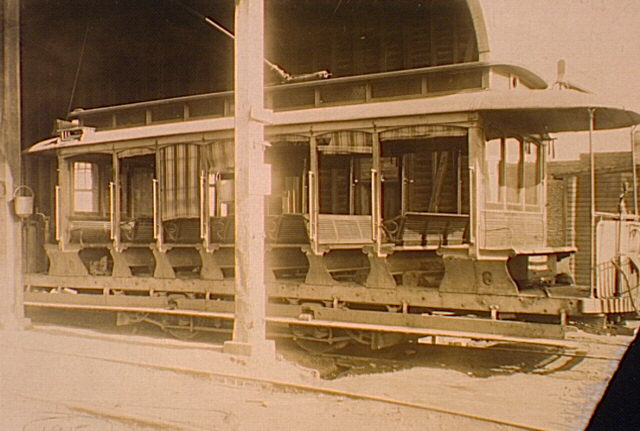
Durham streetcar (1915). Streetcars traveled up Broad Street through Old West Durham.
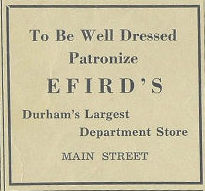

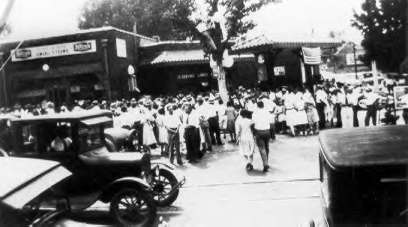
Tree-Sitter at Dennis's Gas Station. Contest (1929): Crowd congregates around tree located beside gas station to view Arnold Taylor, who sat in the tree for 6-7 weeks competing in a national tree-sitting contest. Event occurred at the corner of Broad & Markham. Note stopped traffic and other commercial stores --cut-rate drug store and quickie take-out. (Source: NC Collection)
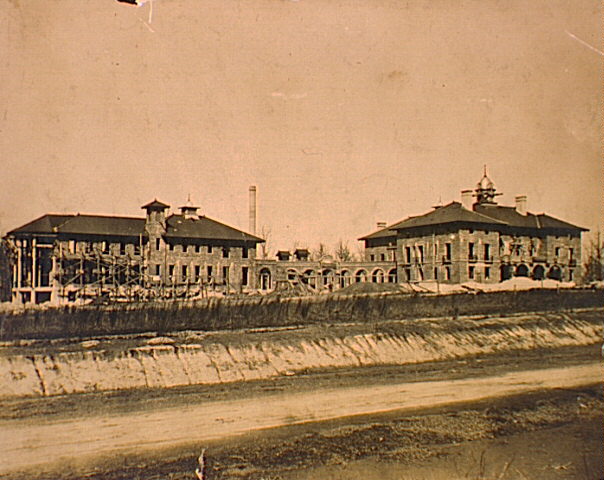
Watts Hospital (under construction with Broad Street in the foreground). In 1965, Watts Hospital was sued for remaining all-white and was forced to integrate its staff to secure federal funds to build its addition on Maryland Avenue.

At the other end of Broad Street (south of the railroad tracks) was Monkey Top and Monkey Bottom. Here, Dewey and Nettie Carden stand in front of their home at 404 Case Street in Monkey Bottom (so named because some monkeys who escaped from their cage at nearby Erwin Auditorium were never found).
"I lived for many years in Monkey Bottom, between Swift
Avenue and Erwin Field. I trudged through the woods to
Campus Drive and caught rides to class sometimes. We
bought groceries from Mrs. Jackson, a dignified
Christian lady of seventy-five who sold a few things
in one room of her three-room house. Some of us would
try new items when her welfare checks got screwed up,
or when the rent went up on her, or when the wholesale
house quit selling half-cases and only sold whole
cases of things. Or when it was cold. She makes
home-made butter, and buttermilk, and she gave us
collard greens and turnips from her garden. She used a
crutch and had bad arthritis; and she always hugged
us, even when we were really hairy.
I remember how hard it was for her when the city [at
Duke's request] tore down a fourth of the houses in
Monkey Bottom. They had to move the route of the new
highway so a nursing home for rich but homeless old
people could be built. The houses got removed, the
others moved away out of Durham, and the lots waited
two years empty. They are empty now.
Some students bought a Monkey Bottom house and fixed
it up very creatively. When they moved, they sold it
to Duke. Duke decided not to rent it to anybody. A
friend of mine stayed there for a while, but Duke
found out and tore the place down, to save taxes and
'prevent vandalism.' Duke gets all the houses it can
unless it runs out of money. The neighborhood was
re-zoned 'commercial' last summer. I forget why."
Eckerd's Drug Store
The following essay was submitted with the photograph by Laura McAllister
on April 21, 1983.
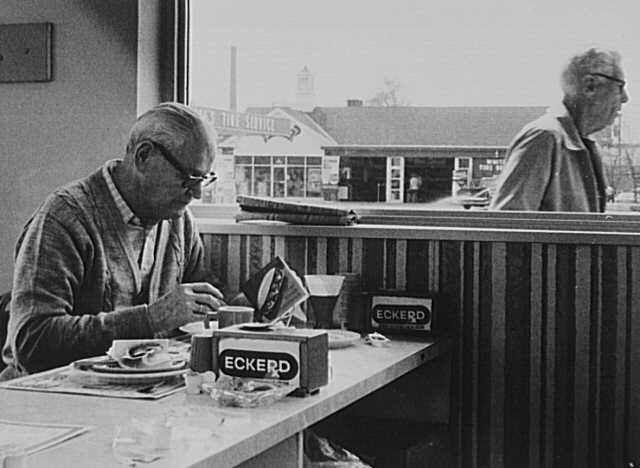
Eckerd's Drugstore (with Broad Street gas station in background).
The first time I observed the other customers from my seat at the Eckerd's counter, I saw many different faces--some bored, some sad, none of them seemingly connected. But it wasn't long before I discerned that there is a group of regulars who frequent Eckerd's at various times throughout the day.
These retired and semi-retired men come to Eckerd's not because of the food or ambiance, but out of a need to occupy themselves. At first this realization struck me as terribly sad because I saw nothing beyond the men's loneliness. But after having gotten to know them, I realized that they don't feel sorry for themselves; therefore, there was no reason for me to. These men live to the best of their ability. All who are physically able continue to work--Ralph at the mill, Ector for Duke Laundry, Riley at the Rock Shop. And whether they work or not, they plan their days. Woody watches a lot of television. Wimpy takes long walks. Ector goes fishing. Riley tends his garden.
What ties these men together is the time they spend at Eckerd's. It is the only place in West Durham where they can sit down next to a familiar face and be greeted warmly by waitresses as loving as Dot and Kathryn.
Yet despite the camaraderie shared among these men and the contentment with their lives illustrated in some of the pictures, there remains a sad element in the faces of the individuals that is also captured on film. Perhaps it is because their lives are slower paced than most that these men appear to feel and express more, whether the emotion be happy or sad. For whatever reason, elder people, much like children, possess a rich quality of expression which many of us seem to lack in our middle years.
The mannerisms and characteristics of the men I photographed at Eckerd's fascinated me from the very beginning and getting to know them has been a joy. The photographs have been an additional reward.
Source: Duke University Center for Documentary Studies Documentary, Photography Collection, 1979-1985 (Duke Special Collections, Perkins Library)
